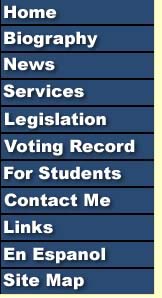|

|
"The bill
signed into law by the President today is the first since I have
been in the immigration committee that reflects our nation's
security concerns as such.
The
legislation provides the agencies with responsibility for
maintaining the security of our borders-INS, Border Patrol, Customs,
the State Department, the FBI and others--with the structure, the
technology, and the resources necessary to do the job.
We have
plugged some of the major loopholes in the law. The agencies now
must close the holes in our borders. The work of Congress, however,
is not finished either. Going forward, Congress must maintain its
commitment to adequately funding and implementing this important
legislation.
Congress
must also be prepared to be vigilant. We must exercise sufficient
oversight so that if new loopholes in the law become apparent, we
must quickly and decisively respond. If the agencies need additional
legislation and resources to do their jobs, we must provide them
with the support they need.
Nevertheless, nine months after
September 11, we are taking a major step to closing the sieve that
has been our border and visa entry system. Once implemented,
however, these reforms will make it easier for law-abiding foreign
nationals to visit or study here, and for law-abiding immigrants to
establish their lives here.
More
importantly, once they are here, their safety-and ours- will be
greatly enhanced. I am pleased the President has joined me and my
colleagues - Senators Kennedy, Kyl, and Brownback - in enacting this
important legislation."
The
following is a summary of the Kennedy-Feinstein-Kyl-Brownback
legislation:
- Interoperable data
system. The Administration would be required to develop
and implement an interoperable law enforcement and intelligence
data system by October 26, 2003 to provide the INS and State
Department immediate access to relevant law enforcement and
intelligence information. The database would be accessible to
foreign service officers issuing visas, federal agents determining
the admissibility of aliens to the U.S. and law enforcement
officers investigating and identifying aliens. The bill also
prevents and protects against the misuse of such
data.
- Reform of
the visa waiver program. The bill would require that each
country participating in the visa waiver program issue
tamper-resistant, machine-readable biometric passports to its
nationals by 2003.
- Reporting
stolen or lost passports. The INS would be required to
enter stolen or lost passport numbers into the interoperable data
system within 72 hours of notification of loss or theft. And until
that system is established, the INS must enter that information
into an existing data system.
- New
requirements for passenger manifests. All commercial
flights and vessels coming to the U.S. from international ports
must provide manifest information about each passenger, crew
member, and other occupant prior to arrival. This section of the
bill also eliminates the 45-minute deadline to clear arriving
passengers.
- New travel
document requirements. Requires all visas, passports, and
other travel documents to be fraud and tamper-resistant and
contain biometric data by October 26, 2003.
- Provision on
Nonimmigrants from Certain Countries. Prohibits the
issuance of nonimmigrant visas to nationals from countries
designated as state sponsors of international terrorism, unless
the Secretary of State, after consulting with the Attorney General
and the heads of other appropriate agencies, determines that the
individuals pose no safety or security threat to the United
States.
- Student visa
reforms. Reforms the student visa process
by:
- Requiring the
Attorney General to notify schools of the student''s entry and
requiring the schools to notify the INS if a student has not
reported to school within 30 days at the beginning of an academic
term. (The monitoring program does not, at present, collect such
critical information as the student''s date of entry, port of
entry, date of school enrollment, date the student leaves school
(e.g., graduates, quits), and the degree program or field of
study. That and other significant information will now be
collected.)
- Requiring the INS,
in consultation with the State Department, to monitor the various
steps involved in admitting foreign students and to notify the
school of the student''s entry. It also requires the school to
notify INS if a student has not reported for school no more than
30 days after the deadline for registering for
classes.
- Mandating the INS to
conduct a periodic review of educational institutions to monitor
their compliance with record-keeping and reporting requirements.
(If an institution or program fails to comply, their authorization
to accept foreign students may be revoked. While the INS currently
reviews educational institutions, reviews have not been done
consistently in recent years and some schools are not diligent in
their record-keeping and reporting responsibilities.)
- More border
personnel. This section authorizes an increase of at
least 1,000 INS inspectors, 1,000 INS investigative personnel,
1,000 Customs Service inspectors, and additional associated
support staff in each of the fiscal years 2002 through 2006 to be
employed at either the northern or southern border.
- Better INS
pay and staffing. To help INS retain border patrol
officers and inspectors, this section would raise their pay grade
and permit the hiring of additional support staff.
- Border
patrol and customs training. To enhance our ability to
identify and intercept would-be terrorists at the border, funds
are provided for the regular training of border patrol, customs
agents, and INS inspectors. In addition, funds are provided to
agencies staffing U.S. ports of entry for continuing
cross-training, to fully train inspectors in using lookout
databases and monitoring passenger traffic patterns, and to expand
the Carrier Consultant Program.
- Better DOS
information and training. This section authorizes funding
to improve the security features of the Department of State''s
(DOS) screening of visa applicants. Improved security features
include: better coordination of international intelligence
information; additional staff; and continuous training of consular
officers.
# #
# |



